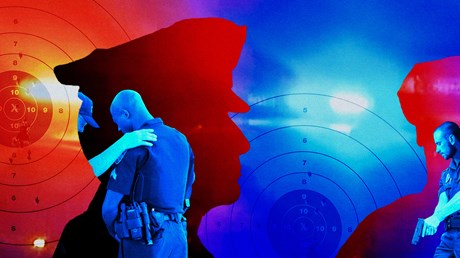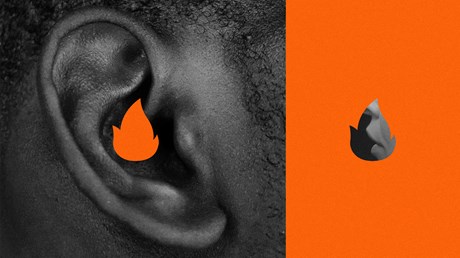Search Results for Early
Links
Baptist International Missions Inc.
|
Early Texas (TX)
|
Early Texas (TX)
|
King James Dictionary
|
Articles
Seeking a Pastor.
|
Videos
News
Spiritual care is essential as stressors among law enforcement rise.
 Sitting in the front row of a supervisor training in 2016, Stamford Police Sgt. Sean Boeger raised his hand every time the instructor asked who had dealt with a particular experience, including homicides, fatal accidents, and child deaths.During his nearly 30 years as a police officer, 48-year-old Boeger had helped with body recovery efforts at Ground Zero after 9/11. When 20 children were killed by a lone shooter in 2012 at Sandy Hook Elementary School in Newtown, Connecticut, just 40 miles from Stamford, Boeger volunteered to help the small Newtown police department. He covered midnight shifts as officers took time to recover.The instructor at the training triggered something in Boeger. Until that class, he had never dwelt much on the effect of witnessing so much trauma. Driving home that evening, he also thought back to another incident, when he responded to a report of a small child falling out of an eighth-story window.“I felt overwhelmed, kind of panic-stricken,” he recalled of that evening. “I think I was more in shock from the stuff I’d never contemplated and the trauma impact it had on me. Because you don’t stop to think about it.”So Boeger did something he had never contemplated previously: He sought help from John Revell, a chaplain who had recently been spending time with his department.“I don’t know what’s going on with me, but I feel like I need to talk to you,” Boeger recalls telling Revell, whom he calls “the Rev.” Revell invited him over, interrupting his family dinnertime, and the two spent an hour or so talking. It opened the door to a longer-term relationship, and an eventual appreciation for the Rev’s consistent presence around ...Continue reading... Sitting in the front row of a supervisor training in 2016, Stamford Police Sgt. Sean Boeger raised his hand every time the instructor asked who had dealt with a particular experience, including homicides, fatal accidents, and child deaths.During his nearly 30 years as a police officer, 48-year-old Boeger had helped with body recovery efforts at Ground Zero after 9/11. When 20 children were killed by a lone shooter in 2012 at Sandy Hook Elementary School in Newtown, Connecticut, just 40 miles from Stamford, Boeger volunteered to help the small Newtown police department. He covered midnight shifts as officers took time to recover.The instructor at the training triggered something in Boeger. Until that class, he had never dwelt much on the effect of witnessing so much trauma. Driving home that evening, he also thought back to another incident, when he responded to a report of a small child falling out of an eighth-story window.“I felt overwhelmed, kind of panic-stricken,” he recalled of that evening. “I think I was more in shock from the stuff I’d never contemplated and the trauma impact it had on me. Because you don’t stop to think about it.”So Boeger did something he had never contemplated previously: He sought help from John Revell, a chaplain who had recently been spending time with his department.“I don’t know what’s going on with me, but I feel like I need to talk to you,” Boeger recalls telling Revell, whom he calls “the Rev.” Revell invited him over, interrupting his family dinnertime, and the two spent an hour or so talking. It opened the door to a longer-term relationship, and an eventual appreciation for the Rev’s consistent presence around ...Continue reading... |
Speech was not God's only miracle at Pentecost. The Spirit also gave the gift of understanding, overcoming division and contempt.
 Tongues of fire, everywhere. In this loud and furious age, a time of protests and counter-protests, words come burning, singeing, scalding, stinging.“Everyone should be quick to listen, slow to speak and slow to become angry,” James wrote, “because human anger does not produce the righteousness that God desires” (1:19–20). But few of us—even those of us who follow Christ—seem to believe that listening more than we speak could possibly meet the reality of these days.We give into the temptation of “thinking the times require using the tools of the enemy,” as Michael Wear says in The Spirit of Our Politics. We justify our tongues of fire as “just the way you play the game,” disregarding our trail of destruction—great forests put to waste by the sparks from our lips (3:5–8).Of course, there’s nothing new under the sun. Rage travels more quickly by gigahertz than messenger, but our era is not uniquely chaotic or tumultuous. The church has lived through worse, not least the dangerous early days after Christ’s resurrection and ascension.“[I’ve] been jailed … beaten up more times than I can count, and at death’s door time after time,” recounted the apostle Paul of his ministry in that time. “I’ve been flogged five times with the Jews’ thirty-nine lashes, beaten by Roman rods three times, pummeled with rocks once. … I’ve had to ford rivers, fend off robbers, struggle with friends, struggle with foes. I’ve been at risk in the city, at risk in the country, endangered by desert sun and sea storm, and betrayed by those I thought were my brothers” (2 Cor. 11:23–27, MSG). ...Continue reading... Tongues of fire, everywhere. In this loud and furious age, a time of protests and counter-protests, words come burning, singeing, scalding, stinging.“Everyone should be quick to listen, slow to speak and slow to become angry,” James wrote, “because human anger does not produce the righteousness that God desires” (1:19–20). But few of us—even those of us who follow Christ—seem to believe that listening more than we speak could possibly meet the reality of these days.We give into the temptation of “thinking the times require using the tools of the enemy,” as Michael Wear says in The Spirit of Our Politics. We justify our tongues of fire as “just the way you play the game,” disregarding our trail of destruction—great forests put to waste by the sparks from our lips (3:5–8).Of course, there’s nothing new under the sun. Rage travels more quickly by gigahertz than messenger, but our era is not uniquely chaotic or tumultuous. The church has lived through worse, not least the dangerous early days after Christ’s resurrection and ascension.“[I’ve] been jailed … beaten up more times than I can count, and at death’s door time after time,” recounted the apostle Paul of his ministry in that time. “I’ve been flogged five times with the Jews’ thirty-nine lashes, beaten by Roman rods three times, pummeled with rocks once. … I’ve had to ford rivers, fend off robbers, struggle with friends, struggle with foes. I’ve been at risk in the city, at risk in the country, endangered by desert sun and sea storm, and betrayed by those I thought were my brothers” (2 Cor. 11:23–27, MSG). ...Continue reading... |
 A federal judge sentenced pro-life advocate Lauren Handy to nearly five years in prison for organizing a blockade at an abortion facility in the nation's capital. As a result, Handy's legal team has vowed to fight what it believes is the “root cause” of the activist's conviction: the FACE Act.? A federal judge sentenced pro-life advocate Lauren Handy to nearly five years in prison for organizing a blockade at an abortion facility in the nation's capital. As a result, Handy's legal team has vowed to fight what it believes is the “root cause” of the activist's conviction: the FACE Act.? |
The wager only scratches the surface of his relevance to a post-Christian era.
 It is a common lament that we live in a post-Christian era. This fact raises challenges to our witness to the world. Most of our audience thinks that, in G. K. Chesterton’s words, Christianity has been tried and found wanting (rather than found wanting and left untried). It is not considered a live option. How do we bear witness well in this cultural context? We might do well to reconsider one of the most enigmatic thinkers in Christian history, Blaise Pascal.Pascal suffers from a public relations problem. As the source of Pascal’s wager, he is often considered a gambling man. He urges the non-believer to bet that God exists. What does one have to lose? In Beyond the Wager: The Christian Brilliance of Blaise Pascal, philosopher Douglas Groothuis shows that there is more to Pascal’s life and thought than his most famous argument. Groothuis demonstrates that we have much to learn from this brilliant thinker. Pascal, he argues, is a crucial thinker for our time.Essential writingsPascal came on the scene in the 17th century, during the early years of the Scientific Revolution. Several of his works contributed to this movement, including treatises on the geometry of conic sections, theories of probability, and conclusions to extensive experiments he had done to test the possibility of a vacuum. He invented the first functional calculator, which he had built to help his father with his work of assessing taxes.His best-known works, however, focus on Christianity. In the Provincial Letters, Pascal defends the Jansenist movement, which was condemned by the Catholic church, against the Jesuits. The Jansenists emphasized that the depth of human sinfulness required a work of God for our salvation. The Christian life ...Continue reading... It is a common lament that we live in a post-Christian era. This fact raises challenges to our witness to the world. Most of our audience thinks that, in G. K. Chesterton’s words, Christianity has been tried and found wanting (rather than found wanting and left untried). It is not considered a live option. How do we bear witness well in this cultural context? We might do well to reconsider one of the most enigmatic thinkers in Christian history, Blaise Pascal.Pascal suffers from a public relations problem. As the source of Pascal’s wager, he is often considered a gambling man. He urges the non-believer to bet that God exists. What does one have to lose? In Beyond the Wager: The Christian Brilliance of Blaise Pascal, philosopher Douglas Groothuis shows that there is more to Pascal’s life and thought than his most famous argument. Groothuis demonstrates that we have much to learn from this brilliant thinker. Pascal, he argues, is a crucial thinker for our time.Essential writingsPascal came on the scene in the 17th century, during the early years of the Scientific Revolution. Several of his works contributed to this movement, including treatises on the geometry of conic sections, theories of probability, and conclusions to extensive experiments he had done to test the possibility of a vacuum. He invented the first functional calculator, which he had built to help his father with his work of assessing taxes.His best-known works, however, focus on Christianity. In the Provincial Letters, Pascal defends the Jansenist movement, which was condemned by the Catholic church, against the Jesuits. The Jansenists emphasized that the depth of human sinfulness required a work of God for our salvation. The Christian life ...Continue reading... |
For seven seasons, the show has offered a clichéd (and nostalgic) vision of how atheists and believers relate to each other.
 My mom was the one who told me to watch The Big Bang Theory. It was a show about nerds—and I was a nerd. She thought I’d enjoy it. A friend had already mentioned that the main character, Sheldon Cooper, was “exactly like” me. After I watched the show, at Mom’s encouragement, I joked that I had mixed feelings about the comparison.The Big Bang Theory was extremely popular and not just with my mom; at its height, it averaged 20 million viewers a night. But it never really resonated with actual dweebs. Its audience was largely Gen X women—not people who were Sheldon but people who “knew a Sheldon,” not the geeks themselves but their mothers and friends.It’s fitting, then, that the even-more-popular Big Bang spinoff would be Young Sheldon, a prequel about the title character’s childhood in East Texas—and that Sheldon’s relationship with his mom, Mary, would be at the heart of the show. Young Sheldon sits at the top of the prime-time rankings; one recent week, the show (which streams on Netflix, Max, and Paramount+) topped all streamed content across US household televisions.As Young Sheldon comes to an end (its series finale airs May 16; a spinoff starring two breakout characters—Georgie and Mandy—has already been announced), so too does the onscreen dynamic between Sheldon and Mary. So too does a nostalgic vision for how the “science vs. religion” debate plays out in our families.Mary is Sheldon’s opposite in nearly every way. He’s a logical atheist physicist with no people skills; Mary is a warm, folksy conservative Christian. In many ways, she serves as an audience surrogate. (For what it’s worth, Mary was my ...Continue reading... My mom was the one who told me to watch The Big Bang Theory. It was a show about nerds—and I was a nerd. She thought I’d enjoy it. A friend had already mentioned that the main character, Sheldon Cooper, was “exactly like” me. After I watched the show, at Mom’s encouragement, I joked that I had mixed feelings about the comparison.The Big Bang Theory was extremely popular and not just with my mom; at its height, it averaged 20 million viewers a night. But it never really resonated with actual dweebs. Its audience was largely Gen X women—not people who were Sheldon but people who “knew a Sheldon,” not the geeks themselves but their mothers and friends.It’s fitting, then, that the even-more-popular Big Bang spinoff would be Young Sheldon, a prequel about the title character’s childhood in East Texas—and that Sheldon’s relationship with his mom, Mary, would be at the heart of the show. Young Sheldon sits at the top of the prime-time rankings; one recent week, the show (which streams on Netflix, Max, and Paramount+) topped all streamed content across US household televisions.As Young Sheldon comes to an end (its series finale airs May 16; a spinoff starring two breakout characters—Georgie and Mandy—has already been announced), so too does the onscreen dynamic between Sheldon and Mary. So too does a nostalgic vision for how the “science vs. religion” debate plays out in our families.Mary is Sheldon’s opposite in nearly every way. He’s a logical atheist physicist with no people skills; Mary is a warm, folksy conservative Christian. In many ways, she serves as an audience surrogate. (For what it’s worth, Mary was my ...Continue reading... |



 Links
Links  Articles
Articles  Blogs
Blogs  Videos
Videos  News
News  Colors
Colors 

 New links
New links










